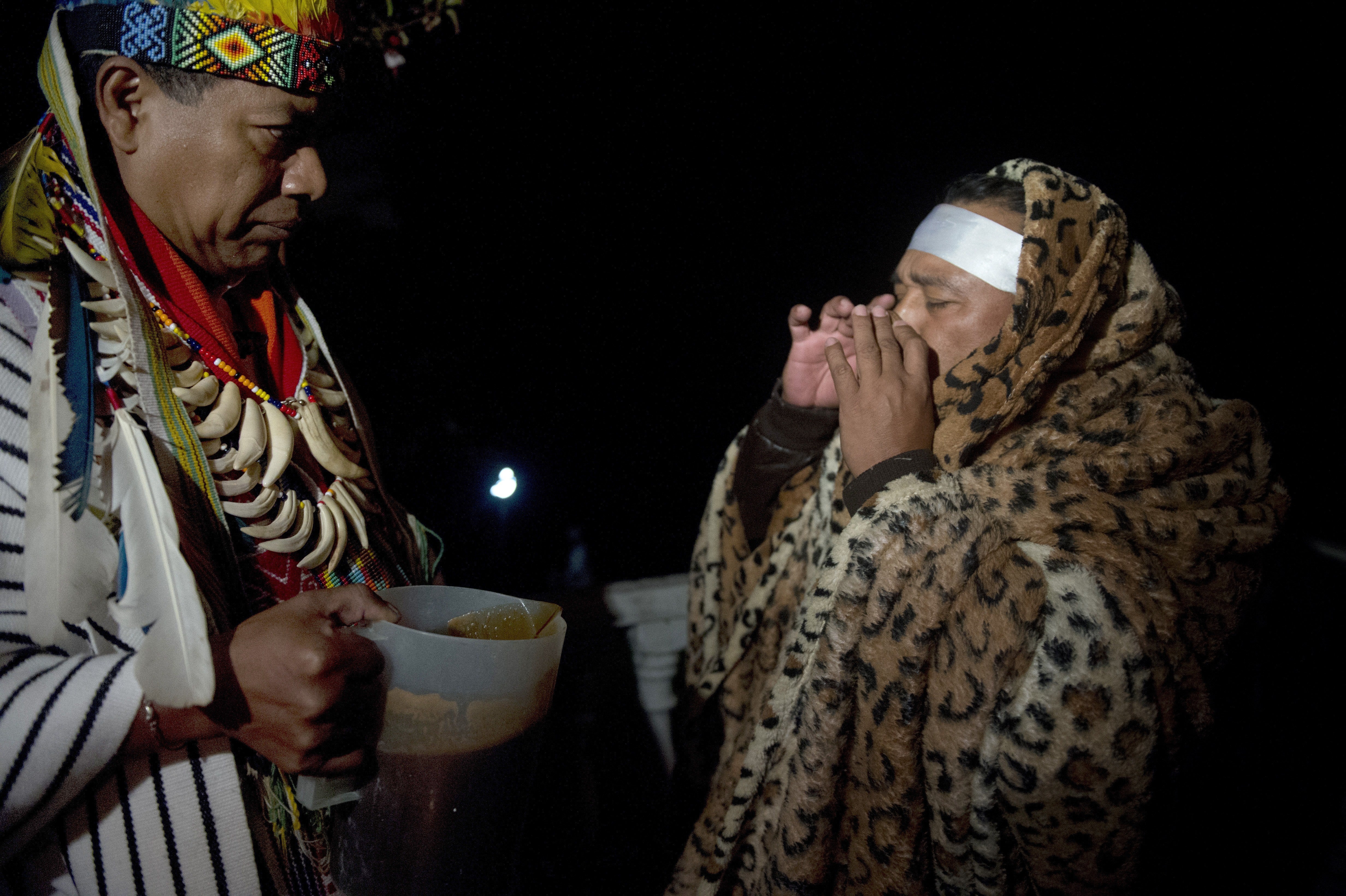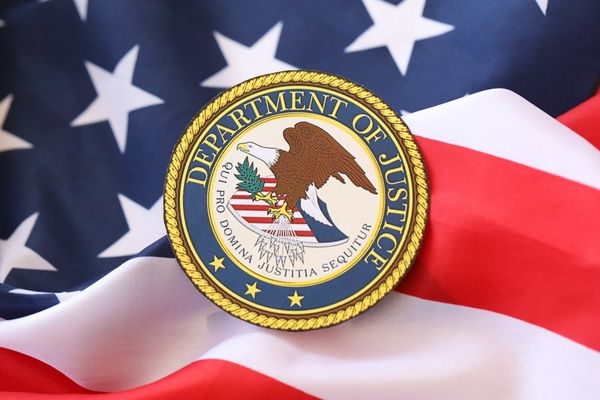An aspiring U.S. Customs and Border Protection officer is suing after getting rejected for the job by admitting she consumes ayahuasca during biweekly religious ceremonies.
Juliana Reis, a Brazilian-American member of União do Vegetal, a Christian reincarnationist sect that regularly drinks a sacramental ayahuasca tea to, the group contends, “heighten spiritual understanding and perception, and bring the practitioners closer to God.” The tea contains various compounds and often produces a hallucinogenic experience.
“Religious practitioners ritually prepare the tea and consider it sacred, much as Catholics believe the wine and host they take at communion to be holy,” according to União do Vegetal, otherwise known as UDV.
But when Reis revealed this during the pre-employment polygraph exam that all CBP applicants undergo, the job offer was withdrawn, according to a federal religious discrimination lawsuit filed Tuesday.
DHS policy disqualifies any job-seekers who have used a substance classified as a Schedule I drug – which the tea contains – within the three years preceding their submission of an employment application.
In 2006, the Supreme Court unanimously upheld the right of UDV members to import and use ayahuasca, which contains the powerful hallucinogen DMT, ending a years-long dispute between the church and the federal government.
The UDV brews an ayahuasca tea they call hoasca, and drink it as a religious sacrament, Reis’ complaint explains. Ayahuasca tea is prepared by brewing two plants together with water, one of which contains dimethyltryptamine – DMT – a drug regulated under the Controlled Substances Act.
However, the Department of Homeland Security, of which CBP is a component agency, still considers the drug’s use to be disqualifying, even though Reis emphasized that she did so “for spiritual purposes only,” according to her suit, which names Homeland Secretary Kristi Noem as the sole defendant.
“Her religious practice is recognized as something very similar to Native Americans with peyote,” attorney Kevin Owen, one of the lawyers representing Reis, told The Independent. “We think that DHS has made a wrong decision here, and that our client shouldn’t have been denied a job with CBP just because of her religious observance.”
Peyote has been legal for use in Native American ceremonies since 1994.
Owen said that UDV’s ayahuasca use is a “bona fide” spiritual custom, and that the Trump administration has professed a strong commitment to religious accommodation – which is what Reis, who was turned down by CBP under the Biden administration, is now seeking. In May, President Donald Trump issued an Executive Order establishing a so-called Religious Liberty Commission, intended to guard against “threats” to unfettered religious practice.
“It shall be the policy of the executive branch to vigorously enforce the historic and robust protections for religious liberty enshrined in Federal law,” Trump’s EO read. “The Founders envisioned a Nation in which religious voices and views are integral to a vibrant public square and human flourishing and in which religious people and institutions are free to practice their faith without fear of discrimination or hostility from the Government.”
According to Owen, there are very few cases that are as clear-cut as the one he and co-counsel Gary Gilbert and Brian Sutherland are bringing on behalf of Reis.
“A lot of times, it's muddier, or a bit grey,” he said. “I don't think the facts here will be in dispute.”
CBP and a spokesperson from Noem’s office did not respond to requests for comment.
.jpeg)
Reis was born in Espirito Santo, Brazil and became a naturalized American citizen in 2009. She became a devoted follower of UDV, which was founded in Brazil in 1961 and now includes more than 21,000 adherents in 11 countries, about 10 years ago, according to her complaint.
Reis’ congregation in Boca Raton, Florida, meets biweekly, usually on the first and third Saturdays of the month, although it “sometimes holds extra services,” the complaint goes on.
“Like the other members of the UDV, Ms. Reis participates in the sacramental use of ayahuasca when she attends UDV services,” it says. “When she drinks ayahuasca tea, she feels the effect of DMT, the active psychotropic ingredient, but she drinks it only for sacramental purposes.”
The UDV’s use of ayahuasca is legal under federal law, which provides an exemption under the Religious Freedom Restoration Act of 1993, according to the complaint.
In October 2018, some three years after Reis joined the UDV, Reis applied for a position as a CBP officer. On December 4, 2018, the complaint says she received a provisional employment offer from CBP at the GS-7 pay rate, which comes with a starting salary of just over $40,000.
To complete the process, Reis would be required to undergo a pre-employment procedure consisting of a medical exam, fitness exam, drug test, structured interview, polygraph exam and background investigation, the complaint states, noting that Reis successfully passed the medical and fitness exams, along with the interview.
Next, Reis was scheduled to sit for the polygraph, known colloquially as a “lie detector test,” which she did in March 2021, according to the complaint.
“Ms. Reis was asked several questions about drug use during the exam,” the complaint states. “When the polygraph examiner asked her about [her] use of psychoactive substances, she disclosed her membership in the UDV and explained her religious use of ayahuasca.”

The polygraph examiner asked “extensive questions” about the UDV, all of which Reis answered fully, and later told her she “was doing well,” the complaint contends.
During a lunch break, the complaint says the examiner contacted an adjudicator at CBP’s Personnel Security Division to inquire about Reis’ use of ayahuasca.
The adjudicator told the polygraph examiner that “the admission to recent drug use disqualified Ms. Reis,” and when Reis returned from lunch, she was informed that the test was over, the complaint states.
“At this time, Ms. Reis executed a voluntary written statement for the report of the exam, which explained that she was a ‘member of the Uniao do Vegetal…’ that her church imports the ayahuasca from Brazil, and that she drinks the tea only at church services and ‘for spiritual purposes only,’” according to the complaint.
Still, it says, on April 1, 2021, DHS officially found Reis “unsuitable” for employment with CBP, and four days later sent her an email telling her that the tentative job offer had been rescinded over her ayahuasca use. She subsequently appealed to the Equal Opportunity Employment Commission, unsuccessfully, to intervene, with their final decision coming on May 8, 2025. Reis then filed suit.
Reis’ adherence to “the precepts of the UDV Church, including the regular consumption of sacramental ayahuasca tea,” has been recognized as lawful by the Supreme Court and is protected by Title VII of the Civil Rights Act of 1964,the complaint maintains. At the same time, it alleges that CBP “refused to consider [Reis] for employment because of her religious belief and practice,” and wanted to “avoid providing her with reasonable religious accommodation.”
This, the complaint argues, constitutes religious discrimination in violation of Title VII and accuses CBP of acting “in bad faith and in willful and wanton disregard for [Reis’] federally protected rights.”
“When we went thru the EEOC process and got an administrative decision that wasn't what we had hoped for, we figured we had to go to district court,” Owen, Reis’ the attorney, told The Independent. “She has a sincerely held religious belief, and therefore it's going to be covered by Title VII.”

On Monday, one day before Reis filed suit, the Trump administration further expanded religious liberties for government workers, allowing federal personnel to proselytize on the job.
“Federal employees should never have to choose between their faith and their career,” U.S. Office of Personnel Management Director Scott Kupor said in a press release. “This guidance ensures the federal workplace is not just compliant with the law but welcoming to Americans of all faiths. Under President Trump’s leadership, we are restoring constitutional freedoms and making government a place where people of faith are respected, not sidelined.”
The federal government “is supposed to be a model employer,” according to Owen, noting that he hopes Reis’ lawsuit will spur wider changes for public-sector workers.
“Our client wants to make this situation a case not only vindicating her rights, but also for other people to make sure their religious practices aren’t violated under the law,” Owen said.
Reis says in her suit that she has suffered “emotional distress, inconvenience, humiliation, and other indignities” as a result of the “discriminatory conduct” by CBP and DHS.
She is now seeking damages, to be determined by a jury, for lost wages and benefits, compensatory damages, and punitive damages, plus attorney’s fees and court costs.
Sing-a-longs, crypto-shilling, and Ayahuasca: Ohio State’s commencement speech gone wrong
Deontay Wilder claims he is ‘reborn’ after taking psychedelic South American drug
Next CBS owner promises Trump’s FCC to review ‘complaints of bias’ and eliminate DEI
Semi truck driver takes cops on wild wrong-way chase before crashing into garden
Trump reveals $200M plan for golden ballroom in ‘modernized’ White House East Wing







